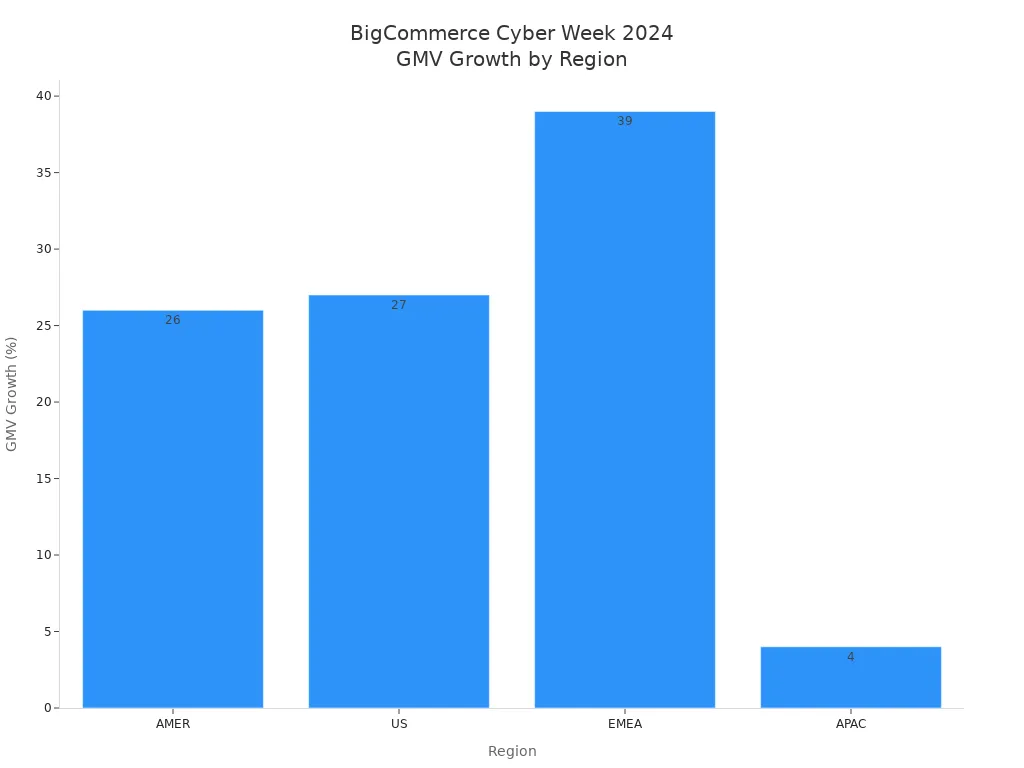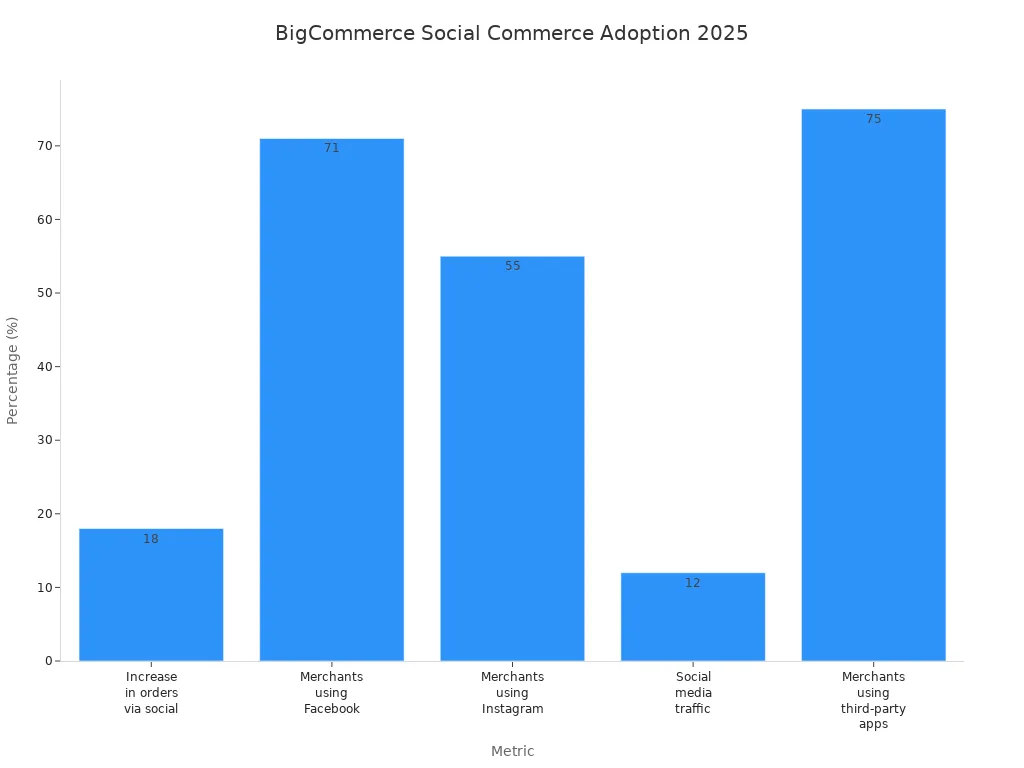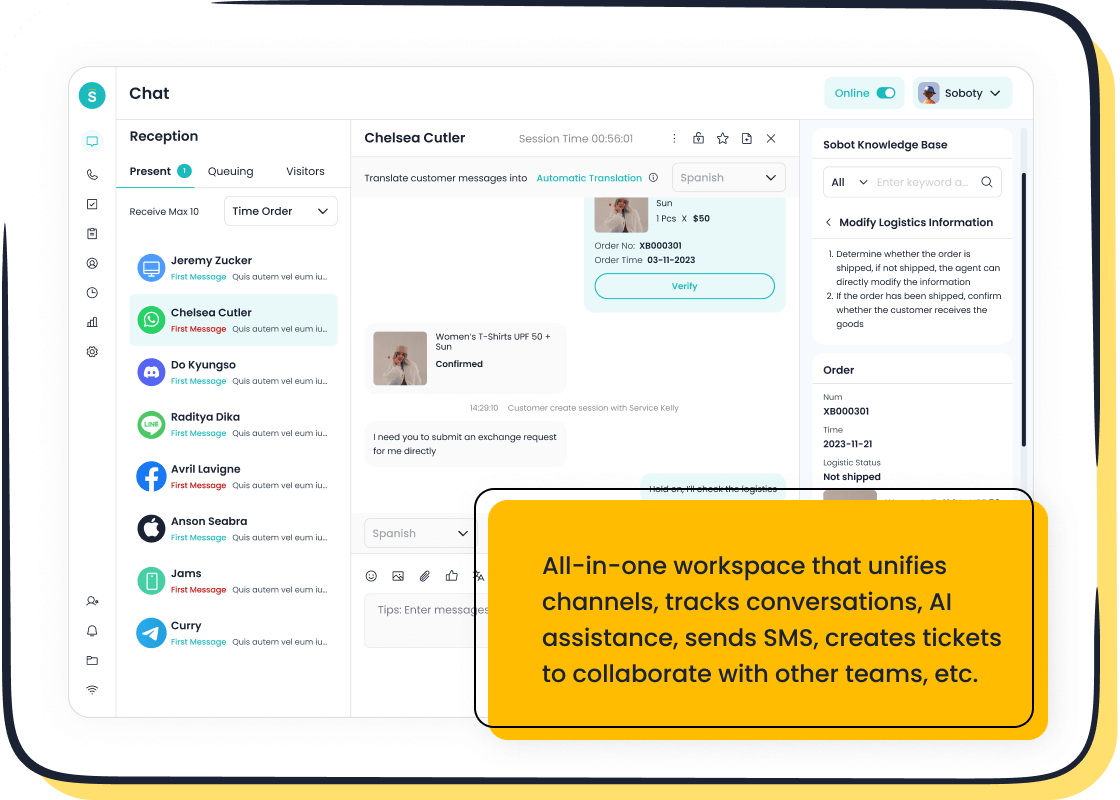BigCommerce Platform Pros and Cons for Modern Ecommerce

BigCommerce stands out as a strong ecommerce platform for 2025. The platform shows steady growth, with over 130,000 merchants worldwide and an 8% revenue increase in 2024. Its market share in the U.S. ecommerce sector reached about 3%, with continued growth expected. The pros and cons of BigCommerce include high scalability, robust integrations, and strong security, but some users note pricing and complexity as challenges. The table below highlights recent BigCommerce market statistics:
| Metric/Aspect | 2024 Data/Performance | 2025 Projection/Outlook |
|---|---|---|
| U.S. eCommerce Market Share | Approximately 3% | Continued growth expected |
| Merchant Base | Over 130,000 merchants globally | Growth implied through ARR and revenue increase |
| Revenue Growth | 8% increase in 2024 | Continued ARR and revenue growth projected |
| Annual Recurring Revenue (ARR) | Increased in 2024, with focus on enterprise clients | Further growth anticipated |
| Enterprise Accounts | Slight decline in number, but higher-value clients | Strategic emphasis on B2B and composable commerce |
| Cyber Week 2024 GMV Growth | 26% increase YoY | N/A |
| Total Orders (Cyber Week) | 13% increase YoY | N/A |
| Average Order Value (AOV) | 11% increase YoY | N/A |
| Regional GMV Growth (Cyber Week) | AMER: 26% YoY, US: 27% GMV growth, EMEA: 39% YoY, APAC: 4% YoY | N/A |
| Mobile Orders (Cyber Week) | 7% increase YoY, 35% of total orders | N/A |
| Social Channel Orders Increase | 18% increase YoY | N/A |

Choosing the right ecommerce platform shapes customer experience, support quality, and business growth. Features like mobile optimization and personalized service can boost customer satisfaction by up to 15%. Omnichannel solutions such as Sobot Live Chat help businesses connect with customers across channels. Sobot AI supports seamless engagement, improves conversion rates, and unifies customer data, making it essential in the evolving landscape of ecommerce.
BigCommerce Trends 2025

The BigCommerce EMEA Summit 2025 highlights innovation and sets the roadmap for future developments in ecommerce. This event brings together industry leaders to discuss trends like AI, blockchain, and composability. BigCommerce statistics from the summit show a strong focus on technology and customer experience. The BigCommerce Partner Summit also emphasizes the importance of flexible solutions for modern merchants.
AI and Personalization
AI shapes the future of ecommerce by making shopping more personal. BigCommerce uses AI to analyze customer data and deliver content, ads, and product recommendations that match each shopper’s preferences. Generative AI creates unique shopping experiences and helps brands build loyalty. AI-powered chatbots and virtual assistants answer questions, help with orders, and support returns. These tools improve customer service and boost conversion rates. AI also helps write product descriptions and blogs, making stores more engaging. Human oversight ensures AI remains ethical and accurate. Sobot Live Chat uses AI to provide instant, personalized support across channels, helping BigCommerce stores increase sales and customer satisfaction.
- AI analyzes customer data for tailored recommendations.
- Generative AI creates unique shopping experiences.
- Chatbots and virtual assistants offer personalized support.
- AI helps with content creation and marketing.
Blockchain and Security
Blockchain technology improves security and trust for BigCommerce merchants. The BigCommerce EMEA Summit 2025 features sessions on using blockchain to protect customer data and prevent fraud. Blockchain records transactions in a secure, transparent way. This helps merchants build trust with shoppers and meet data privacy rules. Composability allows stores to add blockchain features as needed, making security flexible and scalable. Sobot’s platform supports secure customer interactions, helping businesses protect sensitive information and maintain compliance.
Social Commerce
Social commerce continues to grow in 2025. BigCommerce integrates with top social platforms, letting merchants sell directly through Facebook, Instagram, and more. The BigCommerce EMEA Summit 2025 reports that 71% of merchants use Facebook and 55% use Instagram for sales. Social media drives 12% of store traffic, and orders from social channels rose by 18%. Merchants use third-party apps to manage ads and shoppable posts, making it easy to reach new customers.
| Aspect | Detail/Statistic | Significance |
|---|---|---|
| Facebook Ads Extension | Top four app | Direct integration with Meta ad campaigns |
| Top social media channels | Facebook (71%), Instagram (55%) | Merchant preferences for social commerce |
| Social media traffic to stores | 12% | Social commerce’s contribution to store visits |
| Third-party app usage | 75% | Widespread use of social commerce integrations |

BigCommerce stores use social commerce to boost engagement and sales. Shoppable posts and integrated checkouts help brands turn followers into loyal customers. Sobot Live Chat supports omnichannel engagement, allowing merchants to connect with shoppers on their favorite platforms and improve customer experience.
Pros and Cons of BigCommerce
Platform Pros
BigCommerce stands out in the market for its ability to help businesses grow. Many companies choose this ecommerce platform because it supports both small shops and large brands. Over 30% of users are mid-market or enterprise-level businesses. This shows that BigCommerce can handle big changes in traffic and sales. The platform also offers unlimited products, categories, and variants, making it easy for stores to expand.
| Aspect | Details |
|---|---|
| Scalability | BigCommerce supports startups and large enterprises. API rate limits help brands scale. The platform handles more traffic and products as businesses grow. |
| Flexibility | Over 100 payment gateways are available. Sellers can use ready-made themes or create custom designs. Multi-storefront and multi-language setups are possible. Custom checkout SDKs and server-side scripting add more options. |
| Integration | More than 800 integrations exist, including Salesforce, HubSpot, and Mailchimp. The App Store grew 20% last year. BigCommerce connects with Amazon, eBay, Walmart, and 65+ payment gateways. Native POS integrations included. |
BigCommerce offers strong B2B upgrades and enterprise-level tools. These features help companies manage complex sales and customer needs. The platform supports both B2B and B2C businesses, making it flexible for different types of customers. Security is another key benefit. BigCommerce uses advanced tools to protect customer data and prevent fraud. This helps businesses build trust and meet privacy rules.
Tip: The importance of composability is growing. BigCommerce lets stores add or remove features as needed. This helps brands stay flexible and respond to market changes.
Sellers can also run promotions easily. The platform supports discounts, coupons, and special offers. These tools help increase conversion rate and boost revenue. Many users praise the flexibility in ecommerce platforms like BigCommerce, especially when they want to customize their stores.
Sobot Live Chat enhances customer support for BigCommerce users. It brings omnichannel engagement, allowing stores to connect with customers on websites, apps, and social media. Sobot’s AI-powered tools help agents respond faster and improve the customer experience. This can lead to a higher conversion rate and more loyal customers.
Platform Cons
While BigCommerce has many strengths, users report some challenges. The pros and cons of BigCommerce include a few drawbacks that businesses should consider before choosing this ecommerce platform.
- BigCommerce uses a tiered pricing structure. When a store’s annual sales pass certain limits, the platform upgrades the plan automatically. This can lead to unexpected higher costs and affect revenue planning.
- The selection of free themes is limited. Many users want more modern and diverse templates.
- Page Builder widgets do not support custom typefaces. This can make it hard for brands to keep a consistent look.
- Abandoned cart features are not available on entry-level plans. Stores must pay extra for this important tool.
- The platform lacks built-in email marketing and subscription features. Businesses need third-party apps for these functions.
- Some users find the platform complex. There are many settings, especially for taxes, which can be overwhelming.
- No built-in POS solution exists. Drop-shipping support is limited.
- Automatic backups require paid apps. This adds to the total cost.
- Some features, like automatic inventory categorization and smart product rules, are missing.
- VAT MOSS tax rate support for EU digital goods sellers is not adequate.
Note: The pros and cons of BigCommerce show that while the platform offers flexibility in ecommerce platforms, it may require extra spending on apps and upgrades.
Customer support is a strong point for BigCommerce. The platform provides 24/7 live agent support starting from the Standard plan. Higher plans offer priority support and dedicated managers. This is better than some competitors, where advanced support often costs more or requires outside help. BigCommerce’s support helps businesses solve problems quickly and keep customers happy.
Sobot Live Chat can further improve support for BigCommerce stores. It unifies customer messages from all channels, making it easier for agents to respond. Sobot’s analytics help businesses track service quality and make data-driven decisions. This leads to better customer satisfaction and higher revenue.
The pros and cons of BigCommerce depend on each business’s needs. Companies should weigh the benefits of scalability, flexibility, and integrations against the possible costs and feature gaps. The market continues to change, so stores must choose tools that help them grow and serve customers well.
BigCommerce vs. Other Ecommerce Platforms
Choosing the right ecommerce platform shapes how a business competes in the market. BigCommerce, Shopify, Magento, and WooCommerce each offer unique features for different business needs. Many companies compare these platforms to find the best fit for their growth and revenue goals.
Shopify
Shopify leads the market with its easy setup and user-friendly interface. Merchants can launch stores quickly and manage products with simple tools. Shopify offers a wide range of themes and apps, making it popular for small and medium businesses. However, transaction fees and limited customization can affect revenue as stores grow. Shopify supports omnichannel sales, but some advanced features require extra apps or higher plans. Sobot Live Chat integrates with Shopify, helping merchants unify customer messages and improve support across channels.
Magento
Magento stands out for its flexibility and advanced features. Many mid-sized and enterprise businesses choose Magento for its ability to handle complex catalogs and high traffic. The table below compares BigCommerce and Magento:
| Aspect | BigCommerce Strengths | Magento Strengths |
|---|---|---|
| Pricing | Predictable monthly fees | Flexible, open-source options |
| Hosting & Maintenance | Managed hosting and security | Full control, but needs expertise |
| Customization | User-friendly, many themes | Limitless, ideal for complex stores |
| Scalability | Scalable SaaS, managed services | Highly scalable, supports large catalogs |
| B2B & Multi-store | Multi-currency, multi-language, easy setup | Advanced multi-store, B2B capabilities |
| Support & Ease of Use | 24/7 support, simple management | Developer community, steep learning curve |
Magento offers advanced B2B features and marketplace extensions, but it requires technical skills and higher investment. BigCommerce provides strong B2B tools with easier management, making it a good choice for businesses seeking growth without heavy technical demands.
WooCommerce
WooCommerce appeals to users who want full control over their store. It runs as a plugin on WordPress, offering flexibility and a large plugin ecosystem. The table below shows key differences:
| Aspect | BigCommerce | WooCommerce |
|---|---|---|
| Hosting & Maintenance | Fully hosted, automatic updates | Self-hosted, manual maintenance |
| Ease of Use | Drag-and-drop, built-in features | Learning curve, plugin management |
| Performance | Managed scaling and reliability | Depends on hosting quality |
| Support | 24/7 support | Community forums |
WooCommerce allows deep customization, but it requires ongoing maintenance and technical knowledge. BigCommerce suits small businesses that want simplicity and peace of mind. Sobot Live Chat supports both platforms, enabling omnichannel engagement and helping businesses boost revenue by improving customer experience.
Note: Integration with solutions like Sobot Live Chat helps merchants on any platform unify customer contact, analyze service quality, and drive market growth.
Ecommerce Platform Integrations

Omnichannel Support
Modern ecommerce success depends on how well a business connects with its customers. BigCommerce supports integrations that help brands reach customers on their favorite channels. Omnichannel support means that customers can interact with a store through websites, mobile apps, and social media platforms like Facebook, Instagram, and WhatsApp. This approach gives customers a seamless experience, no matter where they start or finish their shopping journey.
A store with strong omnichannel support can:
- Respond to customer questions faster.
- Keep all conversations in one place.
- Personalize service based on customer history.
- Increase customer satisfaction and loyalty.
For example, a customer might ask about a product on Instagram, then complete the purchase on the store’s website. Omnichannel support ensures that the customer’s information and conversation history follow them, making the process smooth and easy.
Tip: Studies show that businesses with omnichannel strategies retain 89% of their customers, compared to 33% for those with weak strategies (source).
Sobot Live Chat Integration

Sobot Live Chat helps BigCommerce stores deliver top-level customer engagement. The platform uses predictive intelligence to understand what customers need before they even ask. Deep learning algorithms analyze customer behavior and provide personalized recommendations. This proactive approach solves problems early and keeps customers happy.
Sobot integrates with CRM systems, so agents see a full view of each customer. Advanced natural language processing lets Sobot understand complex questions, which improves the quality of every interaction. The system learns from each chat, so support gets better over time. Sobot also provides detailed analytics, helping stores see what works and where to improve.
Key benefits for BigCommerce stores include:
- Personalized recommendations for customers.
- Proactive support that prevents issues.
- Unified customer data for better service.
- Insights that help stores grow and keep customers coming back.
Sobot Live Chat gives BigCommerce users the tools to build strong relationships with their customers and stand out in a crowded market.
Suitability for Business Types
BigCommerce serves a wide range of business types, but some benefit more from its features than others. The platform’s scalability, integration capabilities, and advanced tools make it especially attractive for enterprise and B2B companies. However, small and medium-sized businesses (SMBs) and direct-to-consumer (DTC) brands can also find value, especially when leveraging omnichannel solutions like Sobot Live Chat to boost customer engagement and revenue.
SMBs
Small and medium-sized businesses often look for platforms that are easy to use and can grow with them. BigCommerce offers strong support for SMBs that need to manage large catalogs or want to combine B2C and B2B sales. The table below shows common use cases for SMBs:
| Use Case | Description |
|---|---|
| Large Catalogue Sites | Multi-brand stores needing SEO, API integration, and custom checkout experiences. |
| B2B Operations | Native B2B features like user management and invoice portals for growing wholesale businesses. |
| Combined B2C and B2B Needs | Hybrid models serving both consumer and business customers from a single site. |
| Headless Commerce | API-first approach for custom storefronts and modern checkout flows. |
Sobot’s ecommerce solutions help SMBs unify customer contact, automate responses, and improve the conversion rate by providing instant support across channels.
Enterprise
Enterprises require platforms that can handle high traffic, complex integrations, and advanced customization. BigCommerce delivers enterprise-level tools such as custom filtering, staging environments, and multi-storefront management. The platform’s headless architecture supports flexibility and scalability, which is vital for large organizations. Enterprises benefit from seamless CRM and ERP integrations, ensuring smooth operations and data flow.
Sobot’s all-in-one contact center solution fits well with enterprise needs. It offers omnichannel support, AI-powered analytics, and unified customer data, helping enterprises increase revenue and deliver consistent service at scale.
B2B
BigCommerce stands out for its b2b upgrades and features designed for wholesale and business clients. Companies can use tools like Configure-Price-Quote (CPQ) and Multi-Company Account Hierarchy to manage complex sales processes. These features allow for bulk invoice payments, advanced permissioning, and efficient quote management. Businesses report faster quote-to-cash cycles and reduced administrative work, which leads to higher operational efficiency.
Sobot’s platform supports B2B merchants by integrating live chat, ticketing, and automated workflows, making it easier to manage multiple accounts and improve customer satisfaction.
DTC
Direct-to-consumer brands need to engage customers across many channels. BigCommerce enables DTC brands to create unified shopping experiences on mobile, email, SMS, and social media. The platform supports live chat, self-service portals, and mobile-friendly storefronts, which are essential for modern shoppers. Brands can gather feedback and use analytics to refine their strategies.
Sobot Live Chat enhances DTC operations by providing instant, personalized support and integrating all customer interactions into one workspace. This approach helps brands build loyalty and drive revenue growth.
Tip: Businesses seeking to unify customer contact and boost efficiency should consider solutions like Sobot for seamless omnichannel engagement. Learn more about Sobot’s ecommerce and retail solutions at Sobot Retail.
BigCommerce gives businesses strong built-in features, high scalability, and no transaction fees. The table below shows the main pros and cons:
| Aspect | Pros | Cons |
|---|---|---|
| Features | SEO tools, analytics, multi-channel selling | Advanced tools cost more |
| Usability | User-friendly for most | Learning curve for beginners |
| Customization | Custom themes | Fewer design options on lower plans |
BigCommerce fits many business types. SMBs and enterprises can grow with its flexible plans. Sobot Live Chat helps BigCommerce stores connect with customers on every channel. For better support and higher sales, businesses should explore omnichannel solutions like Sobot. Learn more about BigCommerce and Sobot at Sobot’s website.
FAQ
What are the main BigCommerce platform pros and cons for modern ecommerce?
BigCommerce offers strong scalability, robust security, and over 800 integrations. Some users report higher costs and a learning curve. Many businesses value its flexibility in ecommerce platforms. Sobot Live Chat helps stores overcome support challenges and improve customer engagement.
How does Sobot Live Chat enhance omnichannel solutions for BigCommerce?
Sobot Live Chat unifies messages from websites, apps, and social media. Agents see all customer data in one workspace. This omnichannel solution increases conversion rates by up to 38% and improves customer satisfaction. Learn more at Sobot Live Chat.
Is BigCommerce suitable for both B2B and DTC brands?
BigCommerce supports B2B features like bulk pricing and custom catalogs. DTC brands use its multi-channel selling and analytics. Many brands benefit from the flexibility in ecommerce platforms. Sobot’s solutions help both business types deliver seamless customer experiences.
What integrations are available for BigCommerce users?
BigCommerce connects with over 800 apps, including CRM, ERP, and marketing tools. Sobot Live Chat integrates easily, providing analytics and unified customer contact. This flexibility in ecommerce platforms helps businesses adapt quickly to market changes.
Why do businesses choose omnichannel solutions for customer support?
Omnichannel solutions let businesses respond on any channel—web, app, or social media. Studies show companies with omnichannel strategies retain 89% of customers (source). Sobot’s platform ensures no missed messages and higher customer loyalty.
See Also
Best Live Chat Platforms Compared: Shopify And Alternatives
Leading Ecommerce Live Chat Solutions To Use In 2024
Ways Live Chat Software Can Increase Ecommerce Revenue
